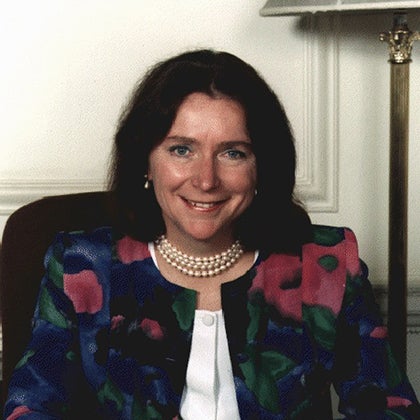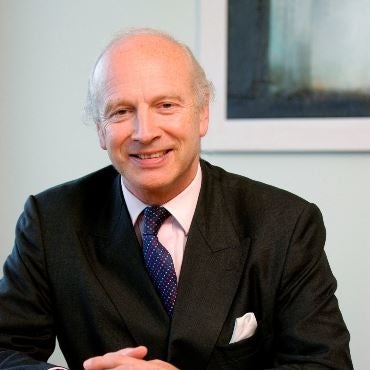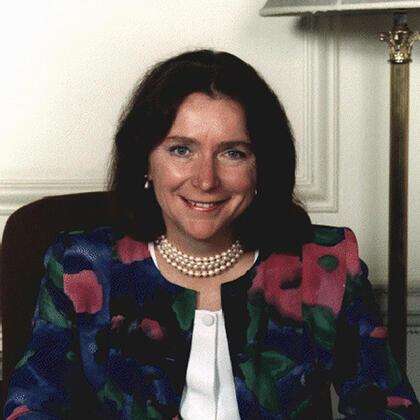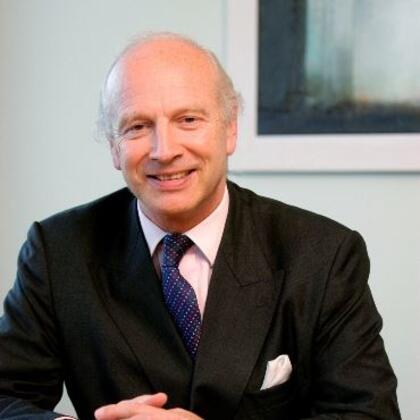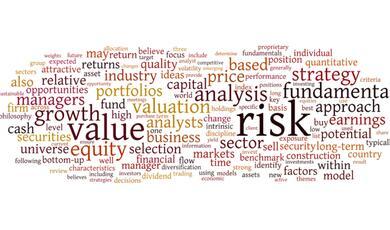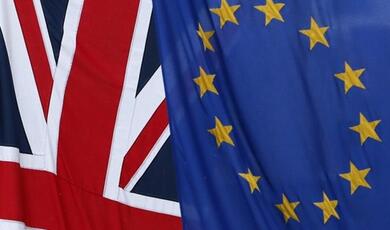Technology, treasurers and financial markets in the 21st century
Share
- Details
- Text
- Audio
- Downloads
- Extra Reading
Technology is changing everything. How will it affect financial markets, exchange and over the counter banking and other financial services in the future? Will exchanges be no more than cheap, commoditised high volume transaction engines? How will intermediaries add value in the new age, or will they disappear? How will technology affect the skills and activities of market users, and particularly corporate treasurers? Will intelligent systems render them largely obsolete?
This discussion includes the following speakers: Daniel Hodson, Mercers' School Memorial Professor of Commerce; Angela Knight, Chief Executive, APCIMS and Gareth Jones, Managing Director, Treasury and Wholesale Banking, Abby National PLC.
Download Text
Technology, treasurers and financial markets in the 21st century
Professor Daniel Hodson
Guests: Angela Knight, Chief Executive, APCIMS and Gareth Jones, former Managing Director Treasury and Wholesale Banking, Abbey National plc and former Chairman of the Association of Corporate Treasurers
Some generic limitations on the advance of technology
Anyone who studies history knows that history is not some inexorable sequence of events, driven by logic and cool calculation. Rather it is a continuum of the consequences of human decisions, some of them illogical and unpredictable, often reacting to unforeseen events, the latter usually driven by human behaviour, but occasionally by Mother Nature herself with no direct human intervention.
History is not about logic; it is about people and their often idiosyncratic behaviour. Machines may be able to predict events to a limited degree, but in order to do so, they rely on reasonably logical human behaviour, without taking into account, for instance, vanity and ego, madness, or some freakish natural occurrence. Would the history of Europe have been different if Napoleon had not been suffering the agonies of piles on the day of the battle of Waterloo an example of nature intervening with a vengeance? The Rothschilds profited from this event, not by being able to predict the outcome of the battle, but by having better communication systems after it had taken place. Equally the reverberations on all aspects of our lives, political, social and commercial from September 11th 2001 will continue for some time; most would argue that they were the products of madness and delusion, and nobody can deny that they were, for the most part, totally unforeseen.
Now there are those who argue that technology will grind on until it can ape human beings and all their activities, including their thought and decision processes. That may well be so in some era a long way ahead of us, but there are indeed practical limitations. And so I dwell on these varied moments in history to illustrate the limitations of technology when it comes to predicting the future, and therefore their practical use in decision making.
For, in the latter, there is the issue of the totally unexpected random event, which has a dramatic impact on outcomes. The sophisticated statistical approaches employed in high level risk analysis are of course technology driven, and take account of such happenings, at least in terms of whether they are sufficiently possible to justify, for instance, the setting aside of capital by a financial institution to meet their financial impact, should it occur. These are marginal possibilities, but they have a tangible likelihood of occurring. However, business men know that business is about risk, and they are principally concerned about most likely outcomes, not about potential events with only a marginal chance of occurring.
And yet they know that their skill may depend on predicting what the inexorable logic of the machine may miss. At one extreme they know that the vanity of a particular Chairman could lead to an acquisition that most others with impeccable and technology underpinned logic may turn down. They also know that the behaviour and sentiment in a highly liquid financial market on a particular day may be affected by the mood of one major player, who unexpectedly decides on a random selling operation against the sentiment. They know that the skill of successful decision making depends on both logic, knowledge of human nature both individual and en masse, and intuition. I do not by the way regard intuition wholly as some metaphysical gift, which defies all practical laws of physics. Rather it is the product of the blend of remembered experiences of any one individual, which the brain, unasked and without any apparent effort, pulls together to provide instincts which are appropriate to the situation on hand. What is certain is that technology at this stage of its development, and in the foreseeable future cannot totally understand nor replicate for decision making purposes either the complexities of human nature, and its contingent illogical emotions and motivations, or human intuition.
Nor does technology find it easy to deal with the frequently illogical structures created by human organisations and society. Thus Eurostar, to the casual observer an extraordinarily sleek example of technology, is in fact a much more complex animal than need be, due to the fundamental differences between British and French railways, compounded by the various requirements of the Channel Tunnel which links them; for instance, different quality tracks and their bends and tilts, variations in the receipt of power, dissimilar signalling arrangements etc. It requires several times more technology, with commensurate cost, to deal with these problems, which only man created.
Likewise early attendees at my Gresham lectures will recall my analysis of exchange settlement arrangements essentially means by which ownership of shares is transferred from one holder to another against payment of the price agreed. In these days of virtual share registers, nothing sounds more within the powers of modern technology than this kind of transaction, and indeed my conclusion was that since, in theory, it was only ultimately a matter of an electronic book entry on the one hand and electronically confirmed receipt of funds on the other, the mere passage of electrons, it would in the end boil down to a totally automated and very cheap process, similar perhaps to the purchase of goods and services by credit card over the internet. In the short term, however, any progress to this is impeded by a whole series of human barriers: transactions in the shares of any given company executed by different exchanges with different settlement houses, although often in the same country, possibly between holders in different countries, and therefore operating in different tax, regulatory and procedural regimes, or almost limitless permutations of the above. Such imperfections point up the limitations of technology in the short term, in the face of human obstacles, and will continue to determine where the line can be drawn, where in effect the inexorable progress of technology is thwarted, until appropriate agreements can be made and procedures and regulation harmonised. Since it is often in the interests of intermediaries and others to perpetuate these imperfections (for they usually create more opportunities for profit than totally automated transactions) the progress towards the inevitable triumph of technology can be agonisingly slow.
To this add the existence of and mechanisms associated with corporate organisations, and particularly governance and the normal hierarchical decision making structure, which ensures human intervention, as laid down, in corporate and in particular trading decisions. In other words, nobody in any corporate organisation has unlimited authority when it comes to committing that organisation.
Human barriers to technological advance can also revolve round the sheer opaqueness of much of the vital data needed to process a decision. A machine can only produce a half baked answer if it simply has a fraction of the total information available to reach such a decision.
There is also of course the human interaction part of transactions. No machine has yet been able to reproduce the relationship building, marketing and sales process, built as it is on a combination of logic, emotion, and the intangible aspects of the building of regard and respect between individuals. Products and services need to be brought to the attention of likely users, understood, in the context of their usefulness to their potential acquirer, and, if necessary adapted to individual corporate needs. Marketing is in so many ways a metaphysical art. In its statistical and market and product comprehension form, it can follow the inexorable logic that technology can both enhance and promote, but it is also aimed at its targets hearts as well as their heads, particularly where there is little to choose between comparable products on offer. The sale must be then negotiated, and contact, on a human level, maintained in order to obtain repeat business and provide the necessary after sales service on the product. It is true that many if not most sales transactions occur on a reasonably automated basis the initial decision has been made, and little human intervention is further necessary but to get to that point, there is usually a significant investment of human time and resources.
Finally in this generic analysis, I turn to the subject of my last lecture, communications and technology. My conclusions were, inter alia, that whilst technology could and would greatly improve the immediacy of communications, that is getting breaking news across not just to the media, but in many cases direct to the ultimate audience, and could assist its subsequent editorial interpretation, commentary and spin, the latter would still require human intervention, particularly between news source and the media; thus senior corporate figures talking one on one to powerful and respected journalists, in order to obtain the best possible construction on the events concerned. In communication, the best copy can depend greatly on human intervention.
I have therefore defined the limitations on the advance of technology relevant to my three interlinked topics of exchanges, intermediaries and treasurers. There are others but I have in mind five: the importance in decision making of foreseeing or anticipating the logically unpredictable, the requirements of human organisations and regimes, lack of transparency, relationships and marketing, and the need for considered commentary over and above technology in communications.
Exchanges as electronic utilities with complicated monopoly structures
The essential process of exchanges throughout the centuries has been the bringing together of buyers and sellers to create sufficient liquidity in a given commodity market for a price to be freely established and disseminated, and for the trading requirements of participants to be satisfied. Where there are a sufficiently large number of buyers and sellers, technology can, for the most part, do the job satisfactorily and efficiently, with the minimum of human intervention.
Thus the process of converting floor and telephone trading into electronic dealing using globally distributed screens, as exemplified for both cash (for immediate delivery, as in stocks and bonds) and derivative (for future committed or conditional delivery) markets has become an inevitable feature of all major exchanges throughout the world. Competition has accelerated this process and though there are a few notable hold outs the Chicago derivative exchanges for instance, where floors exist, although now under considerable pressure it is hard to believe that the vast majority of significant exchanges throughout the world will not within the next few years be entirely electronic. This is true not only of the household names, the great American and European exchanges, but also of the newer smaller exchanges, such as those which deal in more esoteric commodities such as wine. Even the underlying processes, the trading engine whose function is to match buyers and sellers, have become a commodity, with many purveyors, including exchanges, vying, as with so much other available software, in an increasingly competitive market place.
Such technical developments have also brought the retail market, particularly in equities, into the front line. Where formerly no retail participant could have direct access, unless dealing in wholesale quantities, now individual investors and traders can buy and sell electronically via screens sited at home; and, where such people were treated very much as second rate citizens in terms of price sensitive and opinion forming information flow, they now play on a playing field to a level with the mightiest institutions, with the instant availability to all, principally on the world wide web, of results and other important corporate announcements. And in some derivative and commodity exchanges, where contract sizes the amount of the financial or individual commodity which is the subject of one lot, the minimum sized contract tradable have a tendency to be too large for the average retail investor, so called mini contracts have been created with modestly proportioned contracts.
The magic quality that exchange users seek is called Liquidity. They want to trade in the volume, however large, that they desire in such a way that the transaction can be quickly effected and at the price indicated. Consequently there is an iron law of exchanges that says that liquidity in any given commodity or product will tend to concentrate in one place, although some nominal differentiation may impede the process. Thus LIFFE, as a floor based exchange, was able to withstand the electronically traded Eurex/DTB for a considerable time, the best part of ten years, because the differentiator, the floor, was valued by the market. When that value was seen to be illusory, the liquidity quickly switched to the electronic market.
Not that successful traders cared where or what they trade. At LIFFEs opening some pioneer traders from Chicago took a year before they realised that a Swiss Franc wasnt a popular form of sausage.
Electronic market themselves are likely to fall victim to the same process. In an earlier lecture I argued that Electronic Communications Networks or ECNs, which have sprung up to trade equities, particularly in the US, will be a short lived phenomenon, as software is developed which looks across all markets on which a share is traded, and finds the best price, so fulfilling specific orders in shares across a number of actual or quasi exchanges. These pools of liquidity in individual products will flow into larger seas and eventually into one even larger ocean. Whilst the equity market has been slower to take up this process, it only has to look at derivative markets to see the historical inevitability of the process.
The fact is that to all intents and purposes, exchanges are complex and sophisticated monopolies. In a world of liquidity concentration in one place, their main aim is to capture that liquidity and defend it, in effect creating a monopoly in the trading of the relevant share or product. It is very rare for an exchange in a well entrenched position in a given product to lose the hegemony and therefore the liquidity in that product to another exchange, except in very particular circumstances. Of course, at least as far as equities are concerned the best time to do this is at Initial Public Offering or IPO (flotation to old timers) but those who already participate in multiple listings will be seeking to close down rival exchanges and grab all the trading in those shares for themselves.
Their strategy must be to add to the strength of this monopoly, either through consolidation (destroying multiple listing on other exchanges) or through acquisition of more mini monopolies new products and IPOs, or perhaps by acquiring other exchanges with their own share of monopolies.
The latter alternative as a strategic option is underlined by the facts of technology dominated multiple transaction businesses. Once the necessary software and hardware has been acquired and commissioned, the marginal costs of operating the electronic machinery is, well, beans. And competition will drive down transaction fees. Exchanges are, addition to being rather sophisticated monopolies, in danger of becoming utilities. So the logic of exchange acquisition should have little to do with nationalism, or getting larger for the sake of it, but to create economies of scale in a competitive market, and to take over yet more mini monopolies, in the form of the captive liquidity in all the products traded by the exchange acquired. And if the acquisition also enhances the marketing proposition, and which boils down to Come and do your IPO with us then that is an added bonus. Exchanges, never particularly good at articulating their strategies, would particularly gib at the words I have chosen, but they do, in my mind represent the logical reason for setting out on an acquisition trail. Organic expansion has only limited attractions, for it cannot provide much in the way of economies of scale, and, apart from market growth, offers only the prospect of those increased revenues emanating from new IPOs (less products lost to consolidation), and the vagaries of the market, which can, in volume terms, go both up and down.
But where does the potential of technology end in this slightly unstable exchange future? For a start each exchange will operate in a specific regime, governed by its regulatory, fiscal and legal environment, themselves usually determined by where the country in which the exchange is, for residence purposes, located. Such considerations may have a marginal impact on the decision of a market participant as to where to place his business, if he has a choice, and may thus, in the case of that choice, favour a particular exchange as the final monopolist in that product. Exchanges are certainly not above using this aspect of exchanges, and in particular their regulatory environment as a marketing ploy, but its impact can be variable. The rather patchy, old fashioned and inflexible regulatory regime provided for Eurex by the state of Hesse was constantly derided by us at LIFFE in our head to head days, as compared with the widely admired British regulators. But the traders and investors didnt care once the liquidity was established and increasing in Frankfurt.
In reality such considerations are more likely to be an effective selling tool when attempting to draw companies to list at rival exchanges, particularly given the relative commoditisation of most other aspects of their individual offerings, for liquidity in one product does not necessary lead to liquidity in another, particularly in the equity market. Thus one of Euronexts emphases is on the ability to list at one exchange, but with a choice of underlying regimes, French, Dutch or Belgian. And in the non equity fields, product development will continue to generate new financial and commodity derivative products, the most interesting of recent times being the LIFFE equity futures initiative. It is worth saying that such new concepts have a high failure rate, however, and even equity futures are starting slowly but then so did some of the greatest of derivative contracts.
Such non-automatable marketing will also emphasise the coherence of the mini monopolies established at the relevant exchange. This is less important in equities, as I have pointed out, than it is, for instance, in financial derivatives, where the products can be significantly more complex, and price movements in one can be related to price movements in another. Further, derivative exchanges have a requirement for clearing, the process by which a central counterparty, or clearing house as they are called, assures all participants that their bargains will be honoured. The ability to hold a large number if not all of a participants positions at one clearing house is very attractive to the latter. This provides the theoretical proposition that an exchanges clearing house is an important asset, and that if that clearing house clears a number of other exchanges as well, the ability to cross margin, as the process is known, increases the attractiveness of each of those exchanges and of course of the clearing house as a place to clear.
I have argued earlier that one generic drawback of technology is its inability to cope with opacity, the watchword of the over the counter or OTC business. The motives of the two parties to such transactions will vary, but will probably combine the non-availability of such a bargain on an exchange, because of size or because of the complexity or tailoring of the deal. Thus banks will write complex options for their customers, where such products are clearly not available on a recognised exchange. Indeed banks tend to prefer to deal with their customers in this way, because the pricing and therefore profit opportunity is much greater in the totally transparent exchange world. I remember going to see a senior figure in NatWest in the early 90s and being horrified to be told by him that he hated exchanges and wanted all business to be OTC, simply because the former were ruining his profitability. Whatever the motives for the participants, OTC trades are a massive and opaque feature of financial markets.
But they are also feeders for such markets, first because their very price transparency provides a fundamental and usually reliable pricing mechanism for OTC trades. As I mentioned earlier, all equity options are priced off the cash market, and interest rate options off the relevant traded derivative contract. Next they provide the opportunity to hedge positions created by one or even a whole portfolio of OTC positions, once they have been netted down. The OTC market needs exchanges.
But most importantly they are providers of new products for exchanges. When an OTC product becomes so widely used that it becomes virtually commoditised, and the pricing and flexibility advantages of OTC trading disappear, it is usually better for most parties if it is migrated to an exchange. Thus exchange traded interest rate options, swap based products, and equity futures all derived from OTC products. Often the liquidity in such products will be low when first traded on an exchange, but price transparency will attract participants and traders; and it is such smaller new products, obviously with considerable growth potential which may become the great products of tomorrow. It demonstrates how, if a distinguishing feature of OTC markets are their opacity, and therefore inappropriateness for automated trading, the attractions of the latter, enhanced by technology, will draw successful OTC products to the transparency and liquidity of exchanges.
In this case technology assists the new product potential of these cheap commoditised trading engines, with a complicated structure of mini monopolies, called exchanges. Its help will be more limited in the necessary development of acquisition strategies, to acquire more monopolies, and in the successful propagation and communication of the marketing propositions which seek to differentiate one such utility from another.
The value of intermediaries in the new age
There is no bigger mugs game than predicting the end of brokers and other intermediaries. Prima facie the advent of straight through processing or STP should spell the end for those intermediaries who stand between the end market user and the market themselves. STP, which will rapidly become a fact of life in the majority of exchange trades, means that if an investor, using a screen, makes a trade, the transaction is totally digital, electrons all the way; often the broker will not know about the trade till after it is consummated on the exchange, as the investor has direct access to the latter, although the broker will immediately become responsible for it. Even the performance/credit exposure arising from the trade will be electronically booked by the broker, the lines of credit or facility for such business having been automatically checked. Where the trade does go via the broker, it can be handled robotically, as would be the case with smaller and/or less credit worthy clients of the intermediary; if the clients facility is likely to be exceeded or the broker has not authorised him to trade in that product, a bar can be exercised. And all this is now available on existing software.
But look again and compare the brokers role with the generic limitations of technology I discussed at the beginning of this lecture.
For a start, there will require to be a series of human interventions in the relationship for STP to occur. Although automation will take the drudge out of sophisticated analysis, an initial and ongoing assessment of the financial standing and thus the limits of trade allowed to the client will be necessary, not least in respect of the clearing function performed by the broker and unless the client is retail, and comparatively small, will from time to time need a degree of human decision making. All derivative and most cash trades these days involve the use of a central clearing house or counterparty, and since the broker is standing between the client and the central clearing party and is therefore putting his financial standing on the line he needs to be sure that his client is good for the performance risk associated with all exchange trading.
Likewise, whilst there appears to be an irreversible trend towards centralisation of regulation, most regulatory regimes regard brokers and other intermediaries as the fulcrum of their regulatory supervision, delegating responsibilities to them, as indeed to exchanges, for microeconomic regulatory management at the front line, ie at the transaction point. Again, whilst electrons can do most of the hard work, analysis of complex positions, and understanding their regulatory implications and even appropriateness is a burden which will from time to time fall on actual people working in intermediaries, and cannot be replicated by technology.
Further, as I have argued, whilst technology can bring instant breaking news, particularly in financial markets, it has considerably more difficulty in supplying the comment and editorial that inevitably follows. And of course this is an intrinsic role of intermediaries, who are constantly searching for a means to provide buying and selling activity. It is true that many market participants will provide their own analysis, but there is, and will continue to be a vast cohort, who rely on intermediaries for at least some of the commentary and discussion of events to determine whether to buy or sell. In this function they will also rely on human skills over and above that supplied by machines, including specifically the judgement about issues which technology cannot, at least at this stage in its evolution, grasp. Thus whilst a hard headed logical analysis might have concluded that LIFFE must inevitably end up with the London Stock Exchange, a more intuitive and worldly wise commentator would have seen that provided the price tags offered were in the same ballpark, the decision would boil down to personalities, as indeed, it seems likely it did. Sir Brian Williamson as Chairman elect of the Stock Exchange and LIFFE as a division, alongside and equal in status to the operations of the Stock Exchange itself could quite probably have secured the transaction; but students of the personalities would have foreseen the logically unpredictable outcome, concluding that such a scenario was unlikely and that LIFFE would end up in the Euronext camp, with positive implications for those brokers who spotted this and advised their client accordingly.
Brokers too can have a major role in circumventing those facts that technology cannot grasp because of opacity, or lack of transparency. For instance, the fact that an institution has a large line of shares in a given company and has made a publicly undisclosed decision to sell, is fact that a broker can leverage into a transaction, though the putative selling order does not appear on any screen. Indeed many brokers, particularly those who do not provide stockmarket analysis and commentary, make a living in finding out what technology cannot: who are the undisclosed buyers and sellers. In fact in so doing they enhance the liquidity of the exchange, by creating throughput which the mechanics of price and order discovery on the screen cannot, and particularly when an exchange traded product has lower than average liquidity.
And finally, bearing in mind that brokers and intermediaries can, in most cases, only survive commercially because of trades executed through them, the former play a significant part in the marketing efforts of the exchange itself. The latter naturally invest considerable resource in bringing its products to the attention of potential investors and traders, and the community of brokers who stand between the exchange and its clients provide a huge opportunity in marketing terms if properly and continuously briefed and informed. And it is the latters stock in trade to market those exchange traded products to the customers who may value them, with the non altruistic intention of generating revenue through turnover in those very products.
Will treasurers become obsolete?
Treasurers are the Johnny come latelies of the financial world, and as a result rather misunderstood. As I said in an earlier lecture I well remember being asked, in rather deflationary terms, by my Chairman, as Group Treasurer of a top 100 company, what I exactly did, because he hadnt a clue. Very broadly, treasurers are responsible not only for the management of all a corporations monetary assets and liabilities, e.g. deposits and debt, but also for the financial aspects of the balance sheet, including the relationship between debt and equity. Indeed they will often be charged not only with the raising of equity, but also with communications with the stock market. And they will have responsibility not only for financial transactional and bank relationships, but also for internal financial structures, including internal corporate structures and tax, as well as, very often, pension funds.
A comprehensive portfolio, one might argue, but one which might well be challenged by technology, for much of what they do is potentially simulated by intelligent systems, and particularly in the transactional aspects of their roles. Indeed treasury departments these days are highly automated, often with direct interfaces with banking and other suppliers. Treasurers, who often have a tendency towards techie dom, usually pride themselves on their leading edge approach to available hard and software, so that their trade magazines are full of ads and articles cajoling advising and comparing. Nonetheless their roles are protected by the limitations in technical advances set out generically at the start of this discussion.
For a start they are if nothing else financial decision makers, financial engineers with a deep knowledge of financial markets. Thus they form an important role in the chain of command or governance of a corporate entity at the very basic level of What is the level of risk that we wish to take in investing our surplus resources, and in the level of gearing which we are prepared to undertake, i.e. how much debt of any type are we prepared to take on? And within those parameters, what exposure are we ready to accept in relation to any one enterprise, e.g. bank or issuer of bonds or other fixed interest securities? These governance requirements and key decision making of human organisations cannot be replaced by technology.
In making decisions on their own responsibility within these self determined limits, they will, again, be mindful of the limitations of technology. The latters inability, for instance, to predict recent corporate collapses and at a milder level downgrading from a credit quality standpoint indicates how a broader, intuitive, view of portfolio management can be of benefit, not only for making decisions in respect of individual situations, but also in terms of the setting of a risk framework for asset portfolios.
In addition, in their responsibility for internal corporate structure, so often driven by considerable and complex differences in tax regimes, they will also face decisions which may in part be driven by technical analysis, but may also require significant amounts of judgement beyond that offered at this point by machines: for instance, the likelihood of a particular tax related decision to be subsequently challenged in the courts, and the extent to which control over corporate resources may safely be surrendered to offshore entities, for instance.
Of course, they will be in receipt of advice which may be conflicting not only from independent third party advisers, but also from exactly those intermediaries, a part of whose existence in this age of technical development may be justified by its provision, as I argue above. A successful treasurer will be a person of keen business judgement with both analytical qualities and the ability to take a wider view of human unpredictability in the context of portfolio investment, weighing it all in the balance, and sifting it for the best possible decision.
Whereas technology operates best only in conditions of utmost transparency, the markets in which treasurers buy services range from totally transparent to totally opaque. Again it is this at least partial lack of transparency that technology cannot plumb, which treasurers must regard as part of their key professional skills. For instance there is no more untransparent market than that for the charges relating to bank transactions, not least because comparisons are so difficult to achieve; and the banks like it that way. And part of a corporate treasurers skill is to find the lenders, the depositaries, the investment bankers with sophisticated products in a banking market place which does not always sell itself effectively, and where comparisons are often difficult to achieve, particularly where the product is available both OTC or one to one from banks as well on a totally transparent exchange.
Nonetheless marketing from suppliers will play an important part in their life, for because of the very opacity of much of the market, a wise treasurer will dedicate a certain amount of his time, or at least that of a trusted subordinate to receiving calls from bankers and others in order to keep in touch with whatever is on the market, both in terms of financial products, and indeed, for reasons set out above, of software relevant to their activities.
Indeed I have dedicated a significant part of a recent lecture to the subject of bank and other relationships, concluding that their establishment and maintenance on both sides is not only key in ensuring that both make the best of the actual and potential business between them; but also that they (in the case of the treasurer the banking counterparty) are available when times are tough. Bob Hope said that a banker is someone who will lend to you only when you dont need it; it is the treasurers job to see that the banker will lend precisely when the former needs it most. This is the greatest test of the quality of relationships both transactional and human, the latter incorporating trust, respect and positive experience, and virtually impossible to reproduce in a digital form at times of stress. Only intelligent and professional human beings can develop and manage such relationships.
Alongside relationship building the greatest test of a treasurers skills, and one which is constantly on display, is that of negotiation. He is usually constantly involved in transactions, borrowing money, buying ever more sophisticated derivative products, making strategic equity and fixed interest decisions on this own balance sheet and that of his pension fund etc. The underlying products involved are often complex both in terms of pricing, behaviour as markets move up and down, and structure. He must understand them through and through and negotiate accordingly with their purveyors. It is at this point that he can make the greatest impact, positive and negative on his corporate profit and loss account, and it involves human professional skills way beyond those which could be reproduced by technology.
Conclusion
Time to sum up and start the wider discussion. My leading points again are:
· Technology will continue remorselessly on its course of replacing human analysis and decision making. Four areas where it is not likely to make rapid progress are in predicting the logically unpredictable; providing commentary and editorial in communicating new and events; dealing with disparate human organisations, social, fiscal, political and corporate; coping with lack of transparency; and the emotional, non tangible aspects of relationship building and marketing.
· Exchanges are likely to become electronic utilities, comprising a number of individual products, each having a mini monopoly on global liquidity. Acquisitions will fulfil the inevitable strategic need for economies of scale and for adding more such mini monopolies. Exchanges marketing propositions will focus on liquidity and increasing listings and new products, many of which will be attracted from the OTC market by the advantages of transparent, automated trading.
· Intermediaries or brokers will, despite Straight Through Processing, continue to have a major role as technology advances, standing proxy for their clients in the clearing and settlement process, providing the fulcrum of most regulatory regimes, commentary on market news and events leading wherever possible to transactions, providing increased transparency in aspects of traded markets, and marketing ad distributing exchangess products, to their own benefit.
· Treasurers too will embrace technology but will retain key roles beyond mere automation: setting the risk and structural parameters for their companies, decision making within these limits, cutting through the opacity of much of global financial markets, relationship building and negotiation.
© Daniel Hodson 19 February 2002
This event was on Tue, 19 Feb 2002
Support Gresham
Gresham College has offered an outstanding education to the public free of charge for over 400 years. Today, Gresham College plays an important role in fostering a love of learning and a greater understanding of ourselves and the world around us. Your donation will help to widen our reach and to broaden our audience, allowing more people to benefit from a high-quality education from some of the brightest minds.


 Login
Login
